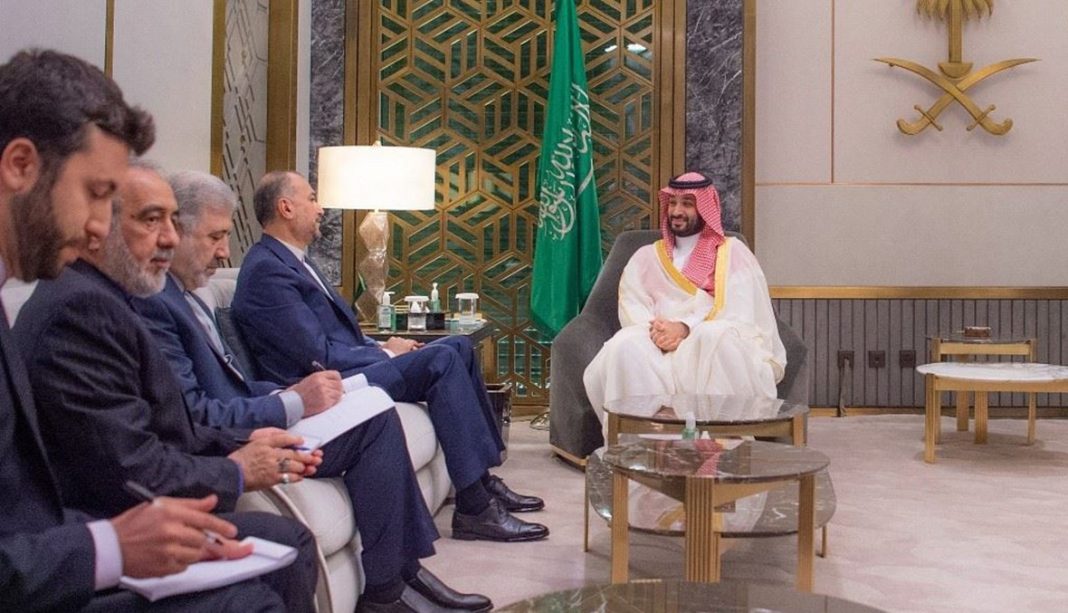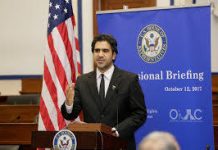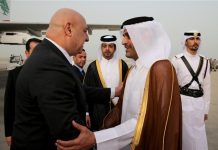Is the Coexistence Between Iranian Dogma and Pragmatism a Decoy or Part of a Grand Bargain?
Raghida Dergham/The National/August 20, 2023
تزاوج العقائدية والبراغماتية الإيرانية… هل هو شرك خادع أم جزء من الصفقة الكبرى؟
راغدة درغام/النهار العربي/20 آب/2023
طرأ جديد مفصلي على السياسات الإيرانية الخارجية، بما يوحي أنّ الاستراتيجية الكبرى لطهران رسمت تحوّلاً جذرياً في العلاقات مع الدول الخليجية العربية، يشمل قيامها بوساطات غير مسبوقة لإعادة صياغة العلاقات الإيرانية- الأميركية، والكلام ليس فقط عن قنوات عُمانية وإنما أيضاً سعودية وقطرية وإماراتية.
إدارة الرئيس جو بايدن بدورها انقلبت على نفسها وسياسة استبعادها المدروس للدول الخليجية العربية عن العلاقة الأميركية- الإيرانية أثناء المفاوضات النووية، وها هي اليوم ترحّب بالانفتاح السعودي- الإيراني لأنّها ترى فيه مصلحة أميركية. القاسم المشترك بين واشنطن وطهران في هذا المنعطف هو حاجتهما الاستراتيجية إلى الدول الخليجية العربية لإصلاح العلاقة الثنائية بينهما. فواشنطن تجد في تطوير العلاقة السعودية- الإيرانية فرصةً لفتح قناة جديدة إضافية للقنوات العُمانية والقطرية للتواصل مع طهران ولاستقطابها بعيداً من روسيا- وذلك لأسباب ذات علاقة بمعادلة الحرب الأوكرانية. إنما العقبة الرئيسية أمام الطموحات في إيران جديدة نوعياً، وهي التفاوت والتصادم بين عقائدية الجمهورية الإسلامية الإيرانية وبراغماتيتها الانتقالية.
جميلٌ ما قاله وزير خارجية إيران حسين أمير عبد اللهيان أثناء زيارته الرياض هذا الأسبوع لاستئناف العلاقات الديبلوماسية والتهيئة لزيارة الرئيس الإيراني إلى العاصمة السعودية قريباً. قال: “في إمكاننا العمل مع السعودية لحلّ الموضوعات العالقة في المنطقة بشكل فوري”، مشيراً إلى أنّ طهران تدعم تحقيق الأمن والسلام في المنطقة من دون تجزئة. العبرة في التنفيذ، بالتأكيد. إنما السؤال البديهي، هو أين يقف مرشد الجمهورية آية الله علي خامنئي مما تقوم به الديبلوماسية الإيرانية البراغماتية التي يمثلها الرئيس إبراهيم رئيسي ووزير خارجيته؟ وما هي شروط “الحرس الثوري” الذي يتحكّم بالسياسة الخارجية الإيرانية عبر سلطته على “حزب الله” وأدوار الحرب الإقليمية، كما عبر أدواته التخريبية، كجزء لا يتجزأ من العقيدة الإيرانية القائمة على التوسّع في الجغرافيا العربية وتحديداً العراق وسوريا ولبنان؟ وأين تقع إسرائيل في معادلة المواجهة المستبعدة بينها وبين “حزب الله” بقرار إيراني؟ وهل الاستفراد بلبنان هو المكافأة الإيرانية لـ”حزب الله” مقابل تجميد نشاطاته الإقليمية؟
براغماتية المفاوضات السعودية- الإيرانية فرضت استبعاد الخوض في مسائل معقّدة، مثل الدور الإيراني المباشر وعبر “حزب الله” في كل من العراق وسوريا وبالتأكيد في لبنان. وقع القرار على ضرورة التركيز على المسائل الثنائية والأمن الخليجي في “السلّة الأولى” من المباحثات، على أن تكون أدوار “حزب الله” الإقليمية في “السلّة الثانية”. والسبب أنّ طرح نشاطات “حزب الله” على طاولة المفاوضات من شأنه أن يفجّر المباحثات، لأنّ “الحرس الثوري” لن يسمح لما يُسمّى بالتيار المعتدل في طهران أن يمسّ بهذه الورقة القيّمة لديه. وبالتالي، وقع التفاهم الضمني على استبعاد بحث “حزب الله” في هذه المرحلة من المباحثات كي لا يكون عنصر تفجيرها.
المشكلة في هذا الطرح، هو أنّه يوحي بأنّ هناك استعداداً لإعطاء إيران استثناءات في المنطقة، فيما الواقعية السياسية تفيد أنّ الاستقرار الإقليمي لن يتحقّق من دون معالجة دور إيران وأذرعها، وبالذات “حزب الله”، في العراق وسوريا ولبنان.
استبعاد النقاط الصعبة عن المفاوضات مرحلياً مفهوم، إنما ليس عندما يكون واضحاً أنّ ما تقوم به إيران في العراق أو “حزب الله” في لبنان يؤدّي حكماً إلى تثبيت سيطرتهما القاطعة هناك، فيما تتحوّل الدول الخليجية إلى ساحة لإبراز تحسين أداء وسلوك إيران وأذرعها. هذا خطير مهما بدا أنّه مرحلي وانتقالي.
ما يتردّد في المحافل السياسية هو أنّ إدارة بايدن بدورها لا تمانع أن يتمّ التركيز على “السلّة الأولى” من التفاهمات الخليجية- الإيرانية، لاسيما وأنّها تريد الاستفادة منها لتحسين لغة التفاهم الأميركية- الإيرانية. تأجيل المسائل الشائكة مثل تمسّك “الحرس الثوري” بتنفيذ عقيدة النظام في طهران ومثل مصير سيطرة “حزب الله” على لبنان، يبدو ملائماً لإدارة بايدن، طالما هناك تفاهم ضمني بأن لا مواجهة عسكرية بين “حزب الله” وإسرائيل، بضمانات إيرانية صامتة.
بكلام آخر، هناك معالم مقايضة لها رائحة كريهة، قوامها أنّ واشنطن لن تنجرّ إلى عمليات عدائية تريد إسرائيل لها أن تقوم بها ضدّ إيران، مقابل ضمان طهران عدم انجرار “حزب الله” إلى عمليات عسكرية ضدّ إسرائيل مهما صدر من تصريحات ومزايدات.
موافقة واشنطن غير المعلنة على إقرار الأمن الواقع بوقوع لبنان في قبضة “حزب الله” وإيران، يبدو جزءاً من المقايضة الأوسع التي تكمن في لجم نشاطات “حزب الله” الإقليمية وإطلاق يده قليلاً في سوريا، إنما بعيداً من مواجهة مع إسرائيل هناك.
الأولوية لإدارة بايدن هي في الاستفادة من استعداد الجمهورية الإسلامية الإيرانية أن تغيّر المزاج والأداء في الساحة الخليجية ونحو الولايات المتحدة. المصالحة مع إيران أهم لها من المواجهة مع “حزب الله”. إيران مهمّة لإدارة بايدن في معادلة المواجهة مع روسيا، وإذا كان هناك استعداد لدى طهران لتقبّل الود الأميركي. إنّ إدارة بايدن جاهزة لباقةٍ جديدة من الترغيب على نسق صفقة إطلاق سراح المحتجزين والأسرى مقابل الإفراج عن 6 مليارات دولار من الأصول الإيرانية لدى كوريا الجنوبية بمساعدة قطرية أساسية.
إيران من جهتها تدرك تماماً أنّها في أشدّ الحاجة إلى الولايات المتحدة كمفتاح أساسي لعودتها إلى السوق العالمية، ولتمكّنها من تطوير نفسها وبنيتها التحتية النفطية والتكنولوجية، واستعادة الحياة الطبيعية. هذا مستحيل من دون الولايات المتحدة- وهذا أساس منطق البراغماتيين في إيران. الحليف الروسي بات عاجزاً عن مدّ إيران بما تحتاجه بعدما خاض مغامرته الرهيبة في أوكرانيا. أما الصين، فهي لا تفرض على إيران أن تكون إما معها أو مع الولايات المتحدة، كما أنّ إدارة بايدن لا تخيِّر إيران بين الولايات المتحدة وبين الصين.
رجال الجمهورية الإسلامية الإيرانية لا ينقلبون على عقيدة النظام مهما طغت عليهم البراغماتية. إنّهم يقومون بتعديل modification العقيدة وتلطيف الأداء بما يتناسب مع الواقع الجديد لإنقاذ إيران ولإنقاذ النظام. رجال طهران لا يعيدون النظر بعقيدة النظام. لقد ارتأوا أنّ مصلحة بقاء النظام تقتضي إجراءات التعديل الانتقالية.
رجال طهران يريدون الاحترام الإقليمي وردّ الاعتبار وما يسمّونه بديبلوماسية الكرامة والعزّة. رجال “حزب الله” يريدون تشديد قبضتهم وسيطرتهم على لبنان، وحتى الآن هم يتمتعون بدعم رجال “الحرس الثوري” الأقوياء والحلفاء الأساسيين لمرشد الجمهورية.
البعض، بالذات بين العرب في الخليج، يراهنون على أنّ المعركة الداخلية في إيران ستؤدّي إلى تراجع نفوذ “الحرس الثوري”، لاسيما بعد وفاة مرشد الجمهورية، وبالتالي، سيكون “حزب الله” تنظيماً أضعف وأكثر استعداداً للتأقلم مع التوجّه الجديد لإيران إقليمياً ودولياً- وبالتالي سيأخذ حجمه الطبيعي اقليمياً ولبنانياً.
هذا وارد منطقياً، إلاّ أنّه مجرد احتمال وليس سياسة. وهنا الخطر والخطأ. قد يُقال إنّ العورة في المنظومة الحاكمة وفي التحالفات الانتهازية بين شتى الأحزاب اللبنانية و”حزب الله”، وفي مقدّمتها الأحزاب المسيحية. هذا صحيح. وقد يُقال إنّ انحطاط لبنان وانهياره هو بالدرجة الأولى مسؤولية اللبنانيين، حكومة وأحزاباً ونواباً وشعباً. هذا صحيح أيضاً. إنما كل هذا لا ينفي التالي: إنّ الاستقرار الإقليمي الذي تصبو إليه الدول الخليجية العربية ووضعته حجراً أساسياً في رؤيتها المستقبلية، لن يتحقّق طالما استمر تمكين “حزب الله” من الهيمنة لبنانياً مقابل انحسار نشاطاته إقليمياً. هنا الخطر والخطأ معاً.
وزير الخارجية السعودي الأمير فيصل بن فرحان اعتبر استئناف العلاقات الديبلوماسية مع إيران نقطة مفصلية للأمن في المنطقة، وهذا بالتأكيد صحيح. شدّد أيضاً على تطلّع السعودية لتعزيز العلاقات الثنائية مع طهران، وقال إنّ الرغبة صادقة وجديّة لتعزيز الثقة المتبادلة بين الجانبين. هذا كلام دقيق لأنّ الأمن الإقليمي جزء أساسي من العلاقات الثنائية. هذه ليست بعد مرحلة الثقة التامة، وإنما هي مرحلة الاختبار بحسن نية، وليس فقط على الصعيد الثنائي، لأنّ العلاقات السعودية- الإيرانية أبعد من الثنائية، بل هي جزء من العلاقات الدولية التي تفرزها المرحلة.
كل الدول الأعضاء في مجلس التعاون الخليجي- السعودية والإمارات وقطر وعُمان والكويت والبحرين- تعمل نحو تحسين العلاقات مع إيران. بعضها يلعب دوراً رئيسياً لتحقيق التقارب بين واشنطن وطهران على الصعيد الثنائي والاستراتيجي، كما في إطار المسألة النووية وعملية رفع العقوبات الأميركية عن إيران خطوة بخطوة، بدلاً من الصفقة النووية الكاملة، والتي كانت الدول الخليجية العربية مُستبعَدةً عنها بقرار إيراني وأميركي وأوروبي بموافقة صينية وروسية.
تغيّر الزمن وفرضت الظروف التاريخية تحوّلاً لم يكن في الحساب وهو الحرب الروسية في أوكرانيا وما أسفرت عنه من توسيع لحلف شمال الأطلسي “ناتو” داخل أوروبا وخارجها. إدارة بايدن تريد سلخ إيران عن روسيا بهدف إضعاف روسيا وزيادة عزلها. إنّها تتقدّم بأفكار تدخل في خانة الصفقات الكبرى Grand Bargain مع إيران كما مع السعودية مع اختلاف البنود والأولويات.
إدارة بايدن تضغط على إيران للتوقف عن بيع طائرات مسيّرة مسلّحة إلى روسيا التي تستخدمها في الحرب على أوكرانيا، في إطار التفاهمات الشفوية بين الطرفين. وزير الخارجية أنتوني بلينكن أكّد أنّه سيرحّب بأي خطوات إيرانية لخفض تصعيد “تهديدها النووي المتنامي”، لكن ما يحدث في التفاهمات الأميركية- الإيرانية بالذات عبر الدول الخليجية العربية، يشكّل عناصر صفقة أوسع من خفض التوتر بين واشنطن وطهران- صفقة استراتيجية لها ملامح ما يُسمّى بالـ”غراند بارغين” في منطقة الشرق الأوسط. والشيطان في التفاصيل.
Is the Coexistence Between Iranian Dogma and Pragmatism a Decoy or Part of a Grand Bargain?
Raghida Dergham/The National/August 20, 2023
A pivotal shift has materialized in Iranian foreign policies, suggesting a profound transformation is underway in Tehran’s grand strategy towards relations with Arab Gulf states, which in turn are engaging in unprecedented mediations to reshape Iranian-American relations, not solely through Omani channels, but also involving Saudi, Qatari, and Emirati contributions. For its part, the Biden administration has made a notable about-face, abandoning previous policies of excluding Arab Gulf states from the US-Iranian nuclear negotiations. The Biden administration now welcomes the Saudi-Iranian rapprochement as it aligns with American interests. The shared strategic imperative for both Washington and Tehran requires the Arab Gulf states to help mend bilateral ties between them. Washington perceives the development of Saudi-Iranian relations therefore as an opportunity to establish an additional communication channel with Tehran alongside the Omani and Qatari channels, with a view to nudge Iran away from Russia in the aftermath of the Ukrainian conflict. However, the primary obstacle to such hopes of seeing a new Iran lies in the contradiction between the established dogma of the Islamic Republic of Iran and its transitional pragmatism.
Iran’s Foreign Minister, Hossein Amir Abdollahian, articulated a compelling sentiment during his visit to Riyadh this week, which aimed at restoring diplomatic ties and paving the way for the visit of the Iranian President to the Saudi capital soon. He said that Iran can collaborate with Saudi Arabia to promptly resolve regional issues, underscoring Tehran’s support for achieving security and harmony in the region without fragmentation. Of course, these words await to be matched by deeds. Nonetheless, an obvious question is: where does the Supreme Leader, Ayatollah Ali Khamenei, stand regarding the Iranian pragmatic diplomacy led by President Ebrahim Raisi and the foreign minister? What are the conditions demanded by the Revolutionary Guard, which exercises control over Iranian foreign policy through its authority over Hezbollah and its roles in regional conflicts, in addition to its subversive instruments that are an integral facet of Iran’s expansionist ideology in Arab territories, particularly Iraq, Syria, and Lebanon? How does Israel factor into the equation of the possible but unlikely confrontation with Hezbollah, pending an Iranian decision? Could exclusive sway over Lebanon be granted as compensation for Hezbollah in return for suspending its regional activities?
The pragmatic nature of Saudi-Iranian negotiations has led to the exclusion of complex issues, such as Iran’s direct role and the involvement of Hezbollah in Iraq, Syria, and notably in Lebanon. The emphasis is on bilateral matters and Gulf security in the “first basket” of discussions, while postponing the regional roles of Hezbollah to the “second basket.” This approach is due to concerns that bringing Hezbollah’s activities to the negotiation table could jeopardize the talks, as the IRGC would not permit any interference with this valuable card, especially from the so-called moderate faction in Tehran. Consequently, an implicit agreement has been reached to exclude Hezbollah from this stage of negotiations in order to prevent it from becoming a destabilizing element.
However, the issue with this approach is that it implies a willingness to grant Iran exceptions in the region, while political realism indicates that regional stability cannot be achieved without addressing the role of Iran and its proxies, particularly Hezbollah, in Iraq, Syria, and Lebanon.
Temporarily excluding contentious points from negotiations is understandable, but not when it is evident that Iran’s actions in Iraq or Hezbollah’s role in Lebanon are leading to the entrenchment of their dominance there. Meanwhile, the Gulf states are becoming platforms for showcasing Iran’s improved behavior. This situation is cause for concern, irrespective of how temporary and transitional it may seem.
Within political circles, there are discussions suggesting that the Biden administration does not oppose focusing on the “first basket” of Gulf-Iranian agreements, especially as it intends to benefit from these accords to facilitate US-Iranian accords. Postponing thorny issues like the IRGC’s insistence on upholding Tehran’s ideology and the fate of Hezbollah’s control over Lebanon seems suitable for the Biden administration. This is as long as there is an implicit understanding that there will be no military confrontation between Hezbollah and Israel, through unspoken assurances from Iran.
In other words, there are indications of an unsavory deal, where Washington refrains from engaging in the hostile actions Israel desires against Iran and in return, Tehran commits to preventing Hezbollah from engaging in military operations against Israel, regardless of all the public threats and posturing. Washington’s tacit agreement to acknowledge Hezbollah’s and Iran’s control over Lebanon appears to be part of a broader exchange aiming to limit Hezbollah’s regional activities but allowing it slight freedom of action in Syria while avoiding direct confrontation with Israel.
For the Biden administration, the priority lies in capitalizing on Iran’s willingness to shift its stance and behavior in the Gulf region and towards the United States. Reconciliation with Iran holds more significance than confronting Hezbollah. Iran plays a crucial role for the Biden administration in the equation of countering Russia. If Tehran is willing to accept American goodwill, the Biden administration is prepared for a new package of incentives similar to the deal reached for the release of American detainees and prisoners in exchange for the release of $6 billion of Iranian assets held in South Korea, with essential Qatari assistance.
Iran, for its part, fully comprehends that it is in dire need of the United States to enable it to return to the global markets and develop its oil and technological infrastructure, as well as restore normalcy. This would be impossible without a green light from the United States in the eyes of the pragmatists in Iran. Indeed, their Russian ally has become incapable of supporting Iran following its catastrophic adventure in Ukraine. As for China, it does not impose on Iran the decision to align either with itself or with the United States, nor does the Biden administration seek to force Iran to choose between the United States and China.
The leaders of the Islamic Republic of Iran do not compromise on their regime’s dogma, no matter how much pragmatism may dominate their thinking. Instead, they introduce modifications to their ideology and adopt a more tempered approach to accommodate the new reality. This strategy is designed to sustain the regime. The leaders of Tehran are not reconsidering the fundamental tenets of the regime’s ideology. Rather, they have concluded that the preservation of the regime necessitates transitional adjustments.
The leaders of Tehran aspire to regional respect and the restoration of their prestige, through what they term as a diplomacy rooted in dignity and honor. On the other hand, the leaders of Hezbollah are determined to strengthen their grip and control over Lebanon. Up to this point, they have enjoyed substantial backing from the influential leaders of the IRGC and the key allies of the Supreme Leader.
Some, particularly in the Gulf, are betting that the internal struggle within Iran will lead to the reduction of the IRGC’s influence, particularly after the passing of the Supreme Leader. Consequently, Hezbollah would emerge as weaker and more flexible, willing to align with Iran’s new regional and global trajectory to assume a more proportionate role regionally and within Lebanon.
While this outcome may sound logical, it remains a mere possibility rather than reflecting an established policy. Herein lies the inherent danger and potential miscalculation. One could argue that the problem in Lebanon lies within the ruling class and opportunistic alliances among various Lebanese parties, primarily led by Christian factions. Similarly, one could argue that Lebanon’s degradation and collapse are chiefly the responsibility of the Lebanese government, parties, representatives, and people. However, these facts do not invalidate the following observation: as long as Hezbollah maintains its dominance in Lebanon even while scaling back its regional activities, regional stability as envisioned by the Arab Gulf nations will remain elusive. This is the source of the potential danger and miscalculation.
Saudi Foreign Minister Prince Faisal bin Farhan said that the restoration of diplomatic ties with Iran was a pivotal juncture for regional security, and this is undeniably valid. He further underscored Saudi Arabia’s aspiration to bolster bilateral relations with Tehran, expressing a sincere and earnest desire to cultivate mutual trust between the two sides. This stance is also on the mark, given that regional security forms an integral facet of bilateral relations. Nevertheless, this phase has yet to reach the stage of complete trust; rather, it represents a probation period based on good intentions, extending beyond mere bilateral dynamics. Saudi-Iranian relations go beyond bilateral dimensions, and represent a subset of international relations dictated by current dynamics.
All member states of the Gulf Cooperation Council – Saudi Arabia, the United Arab Emirates, Qatar, Oman, Kuwait, and Bahrain – are working towards improving relations with Iran. Some of them are playing a crucial role in achieving closer ties between Washington and Tehran, both bilaterally and strategically. This includes matters related to the nuclear issue and the gradual removal of US sanctions on Iran, as an alternative to a comprehensive nuclear deal. This comprehensive deal had previously excluded the Arab Gulf states, due to decisions made by Iran, the United States, and Europe, with the agreement of China and Russia.
Times have changed, and historical circumstances have led to an unforeseen shift due to the Russian war in Ukraine and its subsequent expansion of the North Atlantic Treaty Organization (NATO) within and beyond Europe. The Biden administration aims to separate Iran from Russia, with the goal of weakening Russia and increasing its isolation. The administration is putting forth ideas that fit into the framework of “Grand Bargain” agreements with Iran, much like those with Saudi Arabia, albeit with differing terms and priorities.
The Biden administration is pressuring Iran to halt the sale of armed drones to Russia, which Russia is using in the war in Ukraine as part of verbal agreements between the two parties. Secretary of State Antony Blinken has affirmed that he would welcome any steps taken by Iran to deescalate its “growing nuclear threat.” However, the ongoing American-Iranian agreements, particularly through the Arab Gulf states, include elements of a more comprehensive deal that goes beyond the mere reduction of tensions between Washington and Tehran. It would be a strategic deal characterized by aspects similar to what is referred to as the “Grand Bargain” in the Middle East region. The devil, as they say however, is in the details.






















